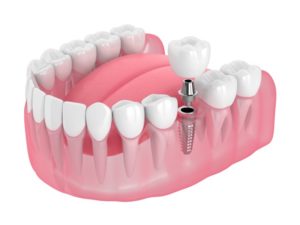
Dental implants have helped millions of people restore their lost teeth. Considered the gold standard of tooth replacements by most dental professionals, they offer so many benefits to your oral health. They give long-lasting stability by replacing teeth from root to crown. Additionally, they are completely natural looking! But you may wonder if they are susceptible to tooth decay. Here’s what to know about dental implants and cavities.
Can Dental Implants Develop Cavities?
To begin with, it would be helpful to start with the three parts of a dental implant:
- Titanium post: Biocompatible steel posts are inserted into the jaw, acting as the tooth root. Over time, they begin to integrate seamlessly with the jawbone in a process called osseointegration.
- Abutment: Sometimes known as the “connector”, the abutment is used to screw the crown into the titanium post.
- Crown: This is the visible part of the restoration. It is a lifelike tooth, usually made from dental-grade porcelain, that is placed on top of the implant.
Cavities are formed when bacteria in the mouth (caused by feeding on sugary and starchy foods and drinks) release acids and attack your tooth’s enamel. Since you no longer have natural teeth where dental implants exist, there are no parts of your restorations that are susceptible to tooth decay!
Helpful Tips to Protect Dental Implants
While your implants are immune to developing cavities, that does not mean they cannot be affected by other oral health issues. For instance, since your implants are embedded into your gums, you will want to be sure to minimize the risk of gum disease. To keep your restorations in good shape and avoid implant failure, keep these tips in mind:
- Maintain a consistent oral health routine: By brushing twice a day and flossing daily, you will not only keep your gums healthy but any remaining natural teeth. This will help prevent inflammation of the gums and keep bad bacteria at bay.
- Eat nutrient-dense foods: To keep your remaining teeth healthy, as well as the soft tissues of your mouth, opt for smile-friendly food choices, such as fresh fruits and veggies, nuts, dairy, fish, and lean meats.
- Visit your dentist – It’s essential to see your dentist every six months for regular checkups and cleanings. They can ensure your implants are healthy, as well as your gums and remaining teeth. They can provide any necessary treatments before any oral health issue becomes more serious.
About the Practice
Lyndon Family Dental keeps the smiles of Fayetteville whole, healthy, and beautiful through the expertise of its two dentists. Their goal is to provide compassionate and high-quality dentistry to meet all your oral health needs. By using advanced dental technology and customized plans, they can help restore your teeth with dental implants. To schedule an appointment, contact them through their website or call (315) 449-0711.

